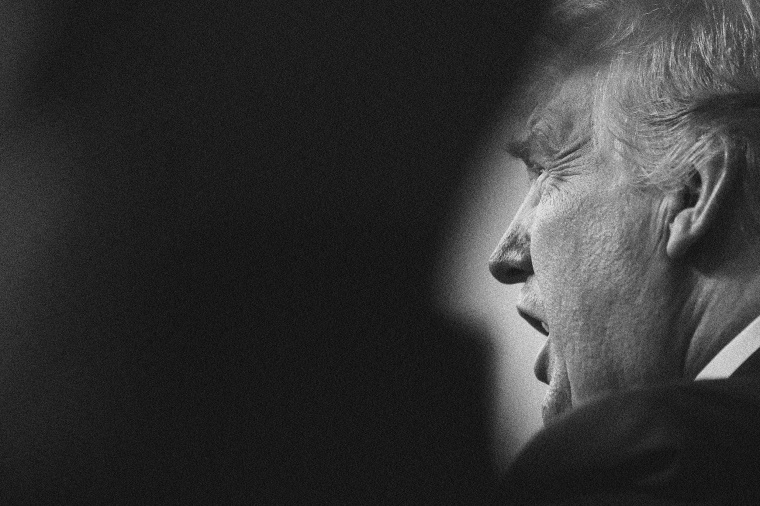
“LIBERATE VIRGINIA, and save your great 2nd Amendment. It is under siege!”
Those words were written this week not by the leader of a sovereign citizens militia, but by the leader — supposedly — of the free world.
On Friday, President Donald Trump tweeted out three such missives, calling on someone (Americans? Gun owners? Trump voters?) to “liberate” the already very free states of Michigan, Virginia and Minnesota.
But clearly, Trump has been on a bit of a tear lately. (Maybe it’s because his approval numbers have slipped to 43 percent since last month.) On Monday, Trump declared that, “When somebody is president of the United States, the authority is total.”
Trump doesn’t have total authority. Nor is he — or anyone else for that matter — in a position to “liberate” the state of Virginia. But it feels like this is somewhat unprecedented rhetorical territory for conservatives, who have made “small government” their motto for decades.
“I think there’s hypocrisy here, in that one, if President Obama had said those words that you heard from President Trump, that the authority is total with the presidency, conservatives’ heads would’ve exploded across the board,” observed Fox News host Bret Baier on Tuesday.
Indeed. But you don’t have to take Baier’s words for it. America’s memory is short; memory in Washington, D.C., can feel even shorter. But there is value in repetition, and record keeping and remembering.
Trump: "The President of the United States has the authority to do what the president has the authority to do, which is very powerful. The president of the united States calls the shots."
“Preventing the executive branch from overstepping the boundaries of its constitutional authority is not a Republican or Democratic issue. It is an American issue that touches the very core of the constitutional design of our government. The separation of powers and its checks and balances are designed to protect individual liberty and we must ensure that it is preserved for future generations,” wrote then-House Judiciary Committee Chairman Bob Goodlatte of Virginia in February 2016.
House Republicans had just formed a special task force to examine the “executive overreach” of President Barack Obama. This was the culmination of a decade spent casting Obama as a “lawless” and emperor-like figure.
In January 2014, Texas Sen. Ted Cruz raised similar GOP alarm bells saying, “Of all the troubling aspects of the Obama presidency, none is more dangerous than the president's persistent pattern of lawlessness, his willingness to disregard the written law and instead enforce his own policies via executive fiat."
On Feb. 1, 2014, then-North Carolina Rep. Mark Meadows — yes, the same Mark Meadows who is now Trump’s chief of staff — opined that Obama "has declared war and not just on Congress but the American people, he’s really talking about bypassing the American people and their will and the fact that they showed up and voted.”
The next day, then-House Budget Committee Chairman Paul Ryan of Wisconsin declared, “we have an increasingly lawless presidency where he is actually doing the job of Congress.”
Iowa Rep. Steve King, who would become the chairman of the aforementioned GOP “task force,” asked: “Where does this abuse of the Constitution stop? At this point our legal scholars, let alone the public, can’t keep up with the multitude of constitutional violations by this president.”
Rep. Jim Jordan, R-Ohio, who today is the ranking Republican on the House Judiciary Committee, thought in November 2014 that Congress should exert its oversight powers saying, “As President Obama said himself in 2013, he is not an emperor; his job is to execute laws that are passed, not write his own. Congress must hold him accountable.”
Former South Carolina Rep. Mick Mulvaney, who just concluded a tenure as Trump’s chief of staff, actually said in 2016
, “We’ve been fighting against an imperial presidency for five and a half years.” Mulvaney went on to claim that any GOP attempts at oversight were d
“When we do it against a Republican president, maybe people will see that it was a principled objection in the first place," he said. "So we actually welcome that opportunity. It might actually be fun, being a strict-constitutionalist congressman doing battle with a non-strict-constitutionalist Republican president.”
I could be wrong, but a president who incites public mutiny isn’t exactly a strict constitutionalist.
Republicans in Congress spent the past decade sensationalizing and politicizing the actions of Obama. And yet, with Trump agitating for kingly authority and making thinly veiled threats against sitting governors in the middle of a pandemic, the GOP chorus of constitutional alarmists has gone conveniently mute.
This hypocrisy is intolerable. Republicans like the ones above — many of whom now work in Trump’s White House — cloaked themselves in constitutional righteousness as a means to advance the politics of destruction. They should be held to account right now by the press and the American public. Moreover, it is imperative that congressional Democrats fill the oversight void left by their Republican colleagues and act as watchdogs over our democracy.
If Democrats are worried about how Trump and Republicans would push back against oversight during this heightened time of concern and uncertainty, just repeat back to them what Cruz wrote in 2014:
“When the president embraces the tactics of a monarch, it becomes incumbent on Congress to wield the constitutional power it has to stop it. Congress, representing the voice of the people, should use every tool available to prevent the president from subverting the rule of law. When the president usurps the legislative power and defies the limits of his authority, it becomes all the more imperative for Congress to act. And Congress should use those powers given to it by the Constitution to counter a lawless executive branch — or it will lose its authority. … A presidential temper tantrum is not an acceptable means of discourse.”